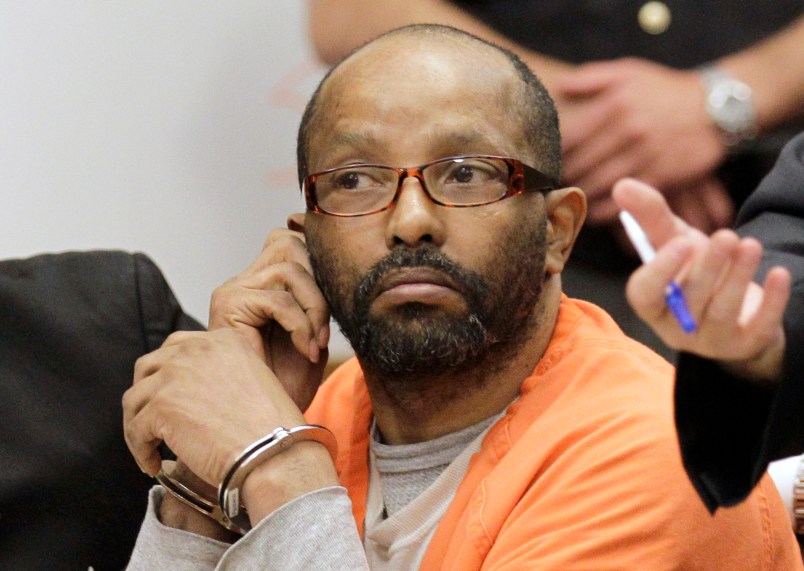COLUMBUS, Ohio (AP) — The Ohio Supreme Court is set to hear arguments that defense attorneys wasted time challenging evidence against a Cleveland man who killed 11 women and hid the remains in and around his home, and should have focused instead on sparing him from a death sentence.
New lawyers for Anthony Sowell say a better strategy would have been to concede Sowell’s overwhelming guilt and push for life without parole based on his background, including a chaotic childhood.
The state Supreme Court scheduled arguments from both sides on Tuesday, with a decision not expected for several months.
Sowell’s attorneys “repeatedly directed the jurors’ attention to gruesome and painfully damning evidence,” according to a 2012 filing by defense attorneys Jeffrey Gamso and Erika Cunliffe, who are representing Sowell in his appeal.
The result was to make the attorneys look desperate and likely irritated jurors by dragging out the trial, Gamso and Cunliffe argued.
Even if the court upheld Sowell’s death sentence, an execution is years away. Sowell could still appeal through the federal courts, and Ohio meanwhile lacks lethal injection drugs.
Sowell, 56, was indicted in 2009 and convicted and sentenced in 2011. His appeal took longer than usual to reach the high court because justices ordered additional arguments two years ago.
In those arguments, Sowell’s attorneys said he deserves a new trial because a judge wrongly closed a portion of jury selection and a hearing where attorneys argued about his police interrogation.
On that matter, prosecutors say Sowell should get a new evidence suppression hearing, but not a new trial. Overall, they say Sowell received a fair trial and his conviction and death sentence should stand.
Nothing in case law or the Constitution supports the argument that his attorneys shouldn’t have challenged the case against him, according to a 2013 filing by Cuyahoga County assistant prosecutors Katherine Mullin and Kristen Sobieski.
“Sowell had an absolute constitutional right to go to trial and to force the State to prove his guilt on every charge in the indictment beyond a reasonable doubt,” they said.
Jurors found Sowell guilty of killing 11 women from June 2007 to July 2009. Police found their mostly nude bodies throughout the house after a woman escaped and said she had been raped in there.
Sowell’s victims were recovering or current drug addicts and most died of strangulation. Some had been decapitated, and others were so badly decomposed that coroners couldn’t say with certainty how they died.
In interviews with police, Sowell said he targeted black women who reminded him of his ex-girlfriend, who had been addicted to crack and left him shortly before the killings began.
___
Andrew Welsh-Huggins can be reached on Twitter at https://twitter.com/awhcolumbus. His work can be found at http://bigstory.ap.org/content/andrew-welsh-huggins
Copyright 2016 The Associated Press. All rights reserved. This material may not be published, broadcast, rewritten or redistributed.







I’m opposed to the death penalty, not for any sort of quasi-moral reasons (“life is a gift from god,” you know the sort of thing), but for a series of purely practical reasons. As gruesome as this killer’s crimes were, I wouldn’t make an exception in this case, or in any case.
But this appeal is quite a stretch. He’s saying that his attorneys were too diligent in defending him. Tough argument to make, to say the least!
This is due process, rightly or wrongly. His rights are your rights too.
I too am opposed to the death penalty, for a number of practical reasons – wrongful convictions (Randal Adams, multiple cases in Illinois, etc.), targeting poor and/or minorities, etc.) – but some cases do test that resolve. Before he died (of cancer; hope it was painful) I always said that in spite of my beliefs I would stand in line to pull the switch for Lawrence Singleton. Not sure where this one stands.